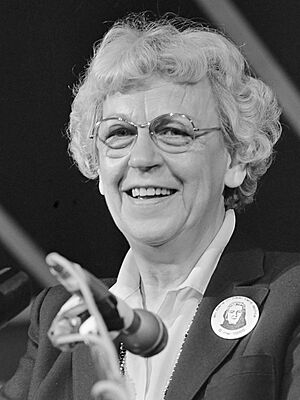Catharina Halkes facts for kids
Catharina Joanna Maria Halkes (born in Vlaardingen on July 2, 1920, and passed away in Nijmegen on April 21, 2011) was an important Dutch thinker. She was a theologian (someone who studies religion and faith) and a feminist (someone who believes in equal rights and opportunities for all people, regardless of gender). She made history by becoming the first professor in the Netherlands to teach about feminism and Christianity. This was at Radboud University Nijmegen from 1983 to 1986.
Catharina Halkes was a Roman Catholic. She first studied Dutch language and literature. Later, she became very active in the women's movement within the church. She became well-known when she was not allowed to speak to Pope John Paul II during his visit to the Netherlands in 1985. Many people see her as the person who started feminist theology in the Netherlands. This is a way of studying religion that looks at it from a woman's perspective and challenges traditional ideas.
Who Was Catharina Halkes?
Catharina Halkes was a pioneering figure in the Netherlands. She helped change how people thought about faith and gender equality. Her work opened new doors for women in religious studies.
Her Important Role
Catharina Halkes was the very first professor of Feminism and Christianity at Radboud University. At that time, the university was known as the Catholic University of Nijmegen. This was a big step forward. It showed that studying women's experiences and rights within a religious context was important.
A Voice for Change
She was a strong voice for women within the Roman Catholic Church. Her work encouraged many others to think about how faith could support equality. She believed that religious teachings should reflect fairness for everyone.
Founding Feminist Theology
Catharina Halkes is often called the "founding mother" of feminist theology in the Netherlands. This means she was one of the first and most important people to develop this field of study there. She helped create a new way to understand religion that included women's experiences and perspectives.
 | Misty Copeland |
 | Raven Wilkinson |
 | Debra Austin |
 | Aesha Ash |


